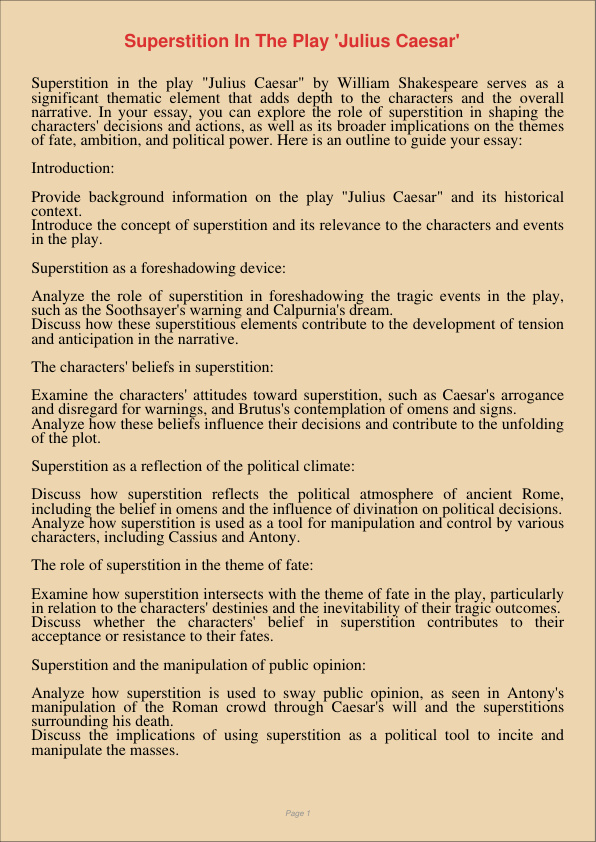Superstition In The Play Julius Caesar
Dec 31, 2023
julius caesar
superstition
Information Technology
Psychology

Superstition in the play “Julius Caesar” by William Shakespeare serves as a significant thematic element that adds depth to the characters and the overall narrative. In your essay, you can explore the role of superstition in shaping the characters’ decisions and actions, as well as its broader implications on the themes of fate, ambition, and political power. Here is an outline to guide your essay:
Introduction:
Provide background information on the play “Julius Caesar” and its historical context. Introduce the concept of superstition and its relevance to the characters and events in the play.
Superstition as a foreshadowing device:
Analyze the role of superstition in foreshadowing the tragic events in the play, such as the Soothsayer’s warning and Calpurnia’s dream. Discuss how these superstitious elements contribute to the development of tension and anticipation in the narrative.
The characters’ beliefs in superstition:
Examine the characters’ attitudes toward superstition, such as Caesar’s arrogance and disregard for warnings, and Brutus’s contemplation of omens and signs. Analyze how these beliefs influence their decisions and contribute to the unfolding of the plot.
Superstition as a reflection of the political climate:
Discuss how superstition reflects the political atmosphere of ancient Rome, including the belief in omens and the influence of divination on political decisions. Analyze how superstition is used as a tool for manipulation and control by various characters, including Cassius and Antony.
The role of superstition in the theme of fate:
Examine how superstition intersects with the theme of fate in the play, particularly in relation to the characters’ destinies and the inevitability of their tragic outcomes. Discuss whether the characters’ belief in superstition contributes to their acceptance or resistance to their fates.
Superstition and the manipulation of public opinion:
Analyze how superstition is used to sway public opinion, as seen in Antony’s manipulation of the Roman crowd through Caesar’s will and the superstitions surrounding his death. Discuss the implications of using superstition as a political tool to incite and manipulate the masses.
Conclusion:
Summarize the key points discussed in the essay. Reflect on the broader implications of superstition in the play, including its impact on the characters’ fates and the portrayal of power dynamics. Consider the relevance of superstition in contemporary society and how it continues to influence human behavior and decision-making.
Ensure that you support your arguments with relevant quotes and examples from the play to strengthen your analysis. Additionally, consider the historical context and the cultural significance of superstition during Shakespeare’s time to provide a comprehensive understanding of its role in the play.